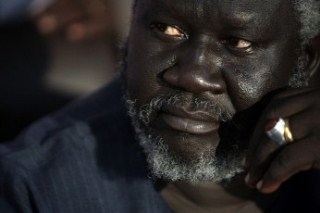Sudan rebels reject Khartoum’s demands connecting humanitarian aid to ceasefire
June 19, 2012 (AGOK) – The leader of a coalition of the Sudanese rebel groups on Wednesday categorically rejected the demands of the Sudanese government to allow the delivery of humanitarian aid to people in conflict-affected areas.
The United Nations, African Union and the Arab League proposed a tripartite plan to allow aid workers to reach the rebel held areas in South Kordofan and Blue Nile where hundreds of thousands of civilians are facing tough humanitarian situation.
Khartoum accepted the tripartite initiative because it provides guarantees that the rebels will not benefit from the humanitarian assistance but asked that the Sudan People’s Liberation Movement-North (SPLM-N) accept a ceasefire before to give the green light for this operation.

Agar claimed that Khartoum is using humanitarian assistance as a “weapon to confuse international community with security arrangements.” Adding that historically Khartoum can not be relied upon to honour its agreements.
The rebel leader held the ruling National Congress Party responsible for the secession of South Sudan, which came in 2011 as a result of a self-determination vote stipulated by the 2005 peace agreement between Khartoum and South the former rebel SPLM.
He said the SRF’s objective is for “total regime change” which will “accept the diversity of the Sudanese people” unlike the current government; which led to South Sudan’s secession.
Composed of the SPLM-N, Justice and Equality Movement, and two factions of the Sudan Liberation Movement, the SRF members refuse to negotiate with the Sudanese government which proposes to separate talks with the SPLM-N on the CPA’s protocol related to the two southern Sudanese states and Darfur crisis for the other groups.
Recently the UN Security Council voted a resolution demanding the SPLM-N to negotiate with the government on the basis of a framework agreement signed in June 2011. But Khartoum rejected talks on this ground, as the SPLM-N demanded a comprehensive process including its allies from Darfur rebels.
With regards to the African Union High Implementation Panel drive for a peaceful solution to the conflict, Agar said that the SRF is committed to cooperation, but not on the “selective solution” advocated by Khartoum.
The SRF is predominantly involved in conflict with the Sudan Armed Forces (SAF) in South Kordofan and Blue Nile states but also includes Darfuri rebels.
In order to expedite regime change Agar, said that diplomatic efforts to further isolate Sudan amongst the international community would be intensified.
He cited recent increases in the prices of basic commodities as evidence that the president of Sudan, Omar al-Bashir, is dispassionate about the “life of the people” and therefore symptomatic of increasing domestic pressure on the government.
Agar described claims coming out of Khartoum that SRF activities in South Kordofan and Blue Nile led to the displacement of thousands of people as “mere concoctions” intended to justify the failure to allow humanitarian aid to the conflict-affected areas.
He claimed the SRF would protect the civil population from attacks directed towards them by SAF, which have prevented them from planting the crops which will provide food they need to survive.
(ST)
